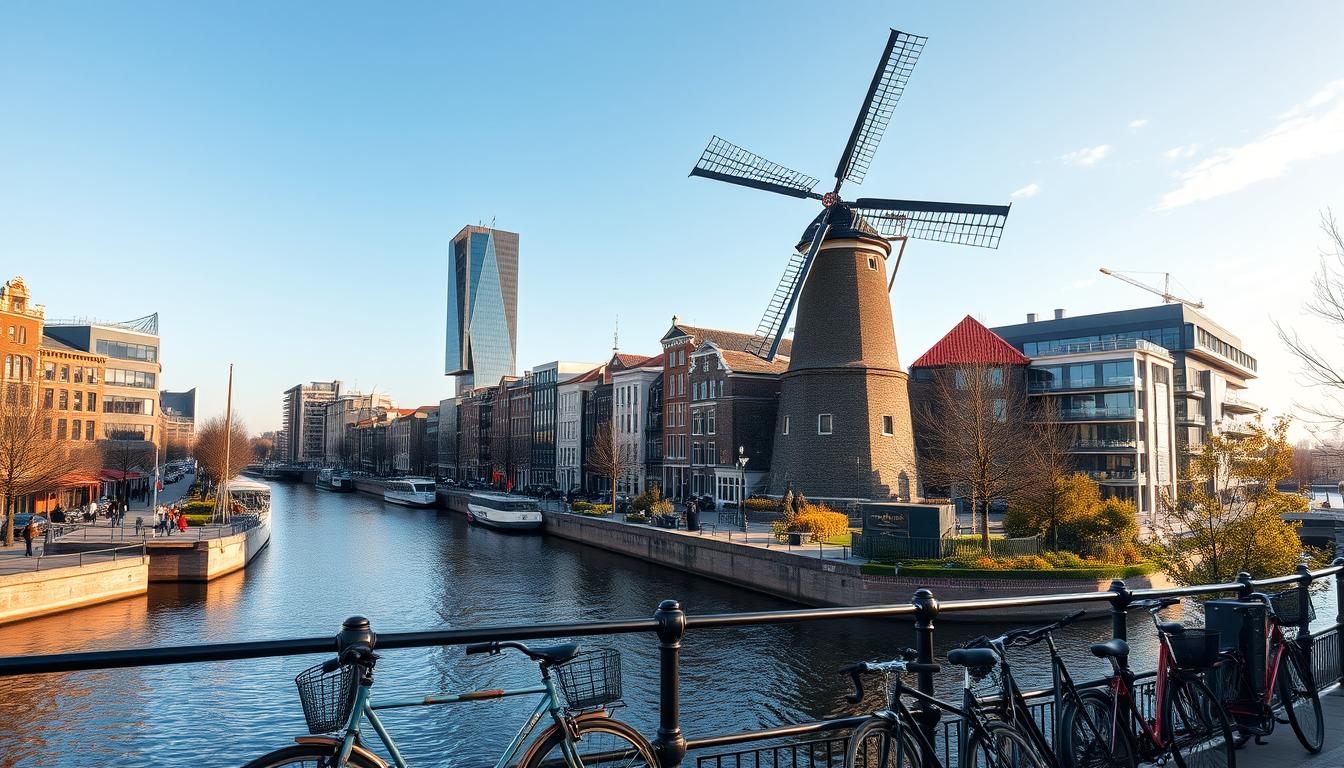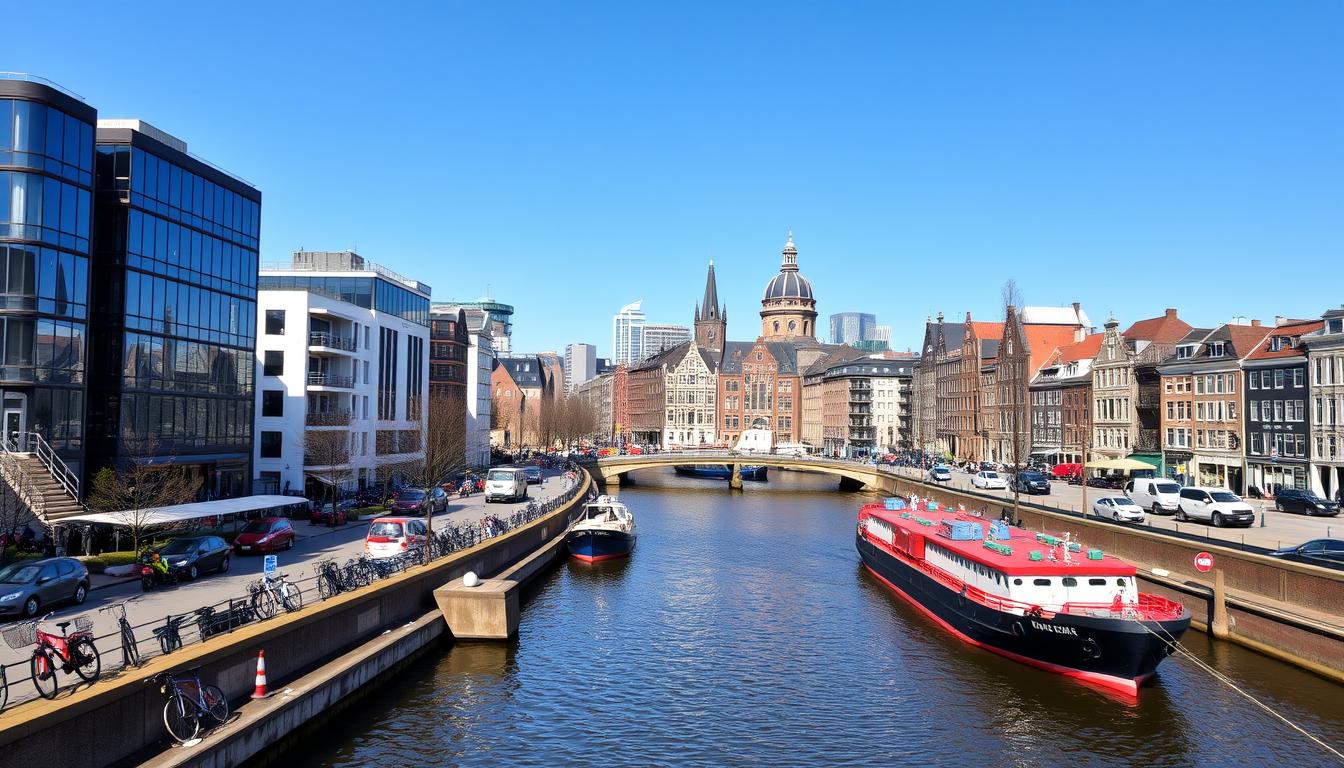Netherlands
At LerriHost, we see the Netherlands as a top spot for businesses looking to grow globally. It’s ranked 4th in the World Bank’s Ease of Doing Business Index. This makes it a great place for expanding your business.
The Netherlands has a stable economy. It has a low corporate tax rate of 15% for profits up to €245,000. For profits over that, the tax is 25.8%. Plus, about 76% of the workforce is active, which is good for business.
About 80% of Dutch businesses are small to medium-sized. This shows how important they are to the economy. With over 1.9 million businesses and a high internet use rate of 98%, the market is diverse and tech-savvy.
The Netherlands is well-located in Europe and has a skilled workforce. It draws over €100 billion in foreign direct investment each year. This makes it a prime spot for growing your business internationally.
We at LerriHost are here to help you enter the Dutch market. We offer services like company formation, nominee services, and banking solutions. We also provide financial services and custom WordPress solutions like SEO and design. This ensures your online presence is strong as you start your new venture. Join us to explore the Netherlands for a successful international business journey.
Understanding the Dutch Market Landscape
The Netherlands is a treasure trove of opportunities. Our Dutch market analysis shows it’s perfect for businesses in many fields.
Key Industries in the Netherlands
The Netherlands is home to key industries like agrifood, IT, chemicals, and creative ones. These sectors are booming, making it great for new and old businesses. Private equity is also keen, with 44% of M&A deals in 2024.
For e-commerce, health, green energy, tech, and real estate, the future looks bright. This is true for 2025 and beyond.
Consumer Behaviour and Trends
Knowing what Dutch consumers want is key. They love new ideas and caring for the planet. But, they’re also watching their spending due to high prices.
VAT changes, like the 9% to 21% hike in 2026, will shape how they shop. It’s important to understand these changes to meet their needs.
Economic Stability and Growth
The Netherlands’ economy is strong, thanks to its trade links. Ports like Rotterdam and airports like Schiphol are key. They help keep the economy stable.
Lower interest rates have made M&A easier. The mid-market is competitive, with big deals like Bridgepoint’s Schuberg Philis buyout. Starting a business here is smart, thanks to good taxes and a lively start-up scene.
Benefits of Expanding to the Netherlands
Expanding your business to the Netherlands brings many benefits. It can greatly improve your global reach and how you operate. Let’s explore the main advantages:
Strategic Location in Europe
The Netherlands is perfectly placed in Europe. It connects you to big markets like Germany, the UK, and France. The Port of Rotterdam is a huge trade hub, handling over 500 million metric tons a year.
Schiphol Airport is top for cargo and passengers in Europe. It’s key for logistics and supply chains. The country’s roads also support 14% of Europe’s international road transport, making it easy to get around.
Access to Skilled Workforce
One big reason to go to the Netherlands is its skilled workforce. 90% of the Dutch speak English, making it easy to fit in. The country’s workers are well-educated and speak many languages, helping businesses grow.
Also, countries with high unemployment rates might offer skilled workers. This is great for new businesses looking to build a strong team.
Innovative Business Environment
The Netherlands is a hotbed for innovation. It has a friendly tax system and government support. For example, the corporate tax rate is 20% on the first €200,000 and 25% for more.
There are almost 100 tax treaties to avoid double taxation. Research & Development companies get a special tax rate of just 5% under the “innovation box.” With 50% of Dutch GDP from international ventures, it’s clear the country is thriving.
Legal Requirements for Setting Up
Starting a business in the Netherlands means knowing the legal rules. You need to register your company and understand taxes and employment laws. Knowing these helps your business run smoothly and legally. Check out Netherlands tax considerations and employment laws Netherlands.
Company Registration Process
Choosing between a branch or subsidiary is key when registering your company. Each choice has legal effects. The Dutch Chamber of Commerce (KvK) makes the process easy, giving you a unique KvK number. Knowing your business well helps you make this choice.
Tax Considerations in the Netherlands
Taxes are important for your business’s finances. The Netherlands has tax breaks like the innovation box. This can lower your tax rate. Also, tax treaties prevent you from being taxed twice, making investments easier.
Employment Law and Regulations
Understanding employment laws is vital for your business. You must give written contracts and follow the minimum wage. Working hours are limited to 40 a week. Knowing these rules helps avoid fines.
In short, knowing about Dutch company registration, taxes, and employment laws is key. This knowledge helps your business start and run well in the Netherlands. It ensures you use the benefits while staying legal.
Choosing the Right Business Structure
Setting up a business in the Netherlands means picking the right structure. This choice affects how you operate, your legal duties, and growth chances. You can choose from a Dutch BV setup, a branch office, or a sole proprietorship. Each has its own benefits and things to consider.
Limited Liability Company (BV)
A Dutch BV setup is great for those wanting flexibility and protection. The BV is like a private limited company in the UK. It needs only €0.01 in share capital, making it easy for small to medium businesses.
The BV is popular because it’s easy to register with the Dutch Chamber of Commerce. It also protects shareholders from company debts. Plus, the tax system is good, matching European corporate tax rates.
Branch Office
Opening a branch office in the Netherlands is smart for companies wanting to enter the EU. It lets you keep control while tapping into the EU’s trade zone. This zone has 26 countries and 420 million people.
A branch office isn’t a legal entity but uses the parent company’s name. This makes some rules easier. But, it must follow Dutch tax laws and register locally.
Sole Proprietorship
Starting a sole proprietorship in the Netherlands is good for solo entrepreneurs or small businesses. Known as “Eenmanszaak,” it has low setup costs and lets you manage everything. You get all the profits but are fully responsible for debts.
This is perfect for small ventures or testing the market. The Dutch market values personal customer service, fitting well with a sole proprietorship’s flexibility.
It’s key to know the details of each structure and how they match your goals. For more on the Netherlands’ business-friendly environment and support for entrepreneurs, check out here.
Developing a Local Business Strategy
Expanding into the Netherlands needs a solid local business strategy. The country’s strong economy, strategic location, and skilled workers are key. A well-thought-out plan is essential to tackle the Dutch market’s unique challenges.
Market Research and Analysis
Doing thorough market research Netherlands means looking at how people shop, trends, and who your competitors are. Harvard Business Review says companies might see losses for up to five years after going global. So, knowing what Dutch people want and who you’re up against is vital to avoid risks. Tools like Wise and CFO Research can help you make smart research plans.
Localising Your Product or Service
Good product localisation means making your product fit what Dutch people need and want. Making it meet local standards improves how users feel and helps build loyalty. For example, Netflix’s success in 190 countries shows the power of customising for each market. By meeting local needs, you can connect better with your audience.
Pricing Strategies
Creating smart Dutch pricing strategies is key to standing out. You need to know what people can afford, their income, and what others charge. Wise’s 2021 study found 51% of small businesses gave up on going global because of payment issues. This shows the importance of pricing that works for you and your customers. Brands like Apoteket have grown by adjusting their delivery costs, showing the value of careful financial planning.
Going into the Netherlands has its ups and downs. Knowing the Dutch business culture and doing deep market research and product localisation can help. For more tips on these, check out this detailed guide.
Navigating Cultural Differences
Learning about Dutch business etiquette and communication is key for those looking to build business ties in the Netherlands. Knowing the local norms and customs can greatly help your success. It ensures smoother interactions with everyone.
Understanding Dutch Business Etiquette
Dutch business etiquette values punctuality and directness. Being on time for meetings is very important, as being late is seen as rude. The Dutch also like clear and direct communication, even in formal settings.
This openness helps in making quick decisions. It also builds trust and transparency in business dealings.
Building Relationships in the Netherlands
Building business relationships in the Netherlands starts with trust and credibility. Unlike some cultures, Dutch professionals focus more on formal meetings and being professional. But, showing respect for their values is important.
Adapting your communication style to be direct and honest is key. This approach helps in creating strong, lasting business partnerships.
Communication Styles
Dutch communication is known for being straightforward and to the point. It’s important to focus on the main points of your conversation. Avoiding small talk is essential.
This direct approach might be hard for some, but it leads to clear and effective communication. Being well-prepared and having all the necessary information shows your professionalism and dedication.
Finding Funding and Investment Opportunities
Expanding your business to the Netherlands opens up many funding and investment options. You can find the perfect match for your venture. The Netherlands offers Dutch government grants, venture capital, and crowdfunding, creating a strong support system for your growth.
Government Grants and Subsidies
The Dutch government supports innovation and economic growth with grants and subsidies. These funds help startups grow without needing to give up equity. For example, grants from Google and Microsoft boost a startup’s reputation, making it more attractive to investors.
Grants from the National Science Foundation and other federal bodies focus on specific research areas. State and local grants, like the Texas Enterprise Fund, support economic development and job creation. These opportunities are great for businesses looking to grow in the Netherlands.
Venture Capital in the Netherlands
The Netherlands has a lively venture capital scene, with many investors ready to back startups. Holland Capital, for instance, invests in mobile solutions, data analytics, and more. Their focus on tech and healthcare, like Sirius Medical, shows their interest in these areas.
Startups can find investments ranging from €10,000 to €50,000, or even more, depending on their growth. Rakesh G., for example, invests in tech and healthcare, showing the variety of opportunities.
Crowdfunding Options
Crowdfunding is a great way for businesses in the Netherlands to raise funds. Platforms like Kickstarter and Indiegogo let entrepreneurs share their ideas with backers. This method is perfect for startups with compelling stories or unique products.
Crowdfunding also helps validate products by showing market demand. It’s a strong option when combined with grants and venture capital, providing a full financing solution.
To learn more about funding opportunities in Belgium, check out Belgium’s entrepreneurial landscape.
Networking and Business Associations
Building a strong network is key for your business in the Netherlands. It helps you understand the local market and make valuable connections. Joining local chambers, attending business events, and using online platforms can boost your networking efforts.
Joining Local Chambers of Commerce
Joining Dutch chambers of commerce is a smart choice. They offer many benefits like access to professionals, advice, and market info. Being part of a local chamber can increase your visibility and credibility, leading to new opportunities.
With 81 trusted Members in the Transeo community from 24 countries, you get full support in the market.
Business Events and Conferences
Attending business events and conferences is a great way to grow your network. Events like the Transeo Summer Summit in Padova, Italy, are perfect for meeting peers and learning about new trends. The Transeo Winter Summit is another example, lasting 2 days and focusing on small business transfers.
Networking Platforms
Networking platforms are also vital for keeping and growing business relationships. They provide access to training and events, helping advisors connect globally. These platforms are for sharing knowledge, best practices, and staying updated on M&A trends.
Marketing Your Business in the Netherlands
To market your business in the Netherlands well, you need to know the local market and what people like. You should use both old and new marketing ways to talk to the Dutch. Let’s look at what’s important.
Digital Marketing Strategies
The Netherlands is very good at using digital stuff. So, digital marketing is key to reach people who love technology. You should use SEO, PPC ads, and content marketing. Using data to improve your ads can help a lot.
Knowing what Dutch people like online can really help. The World Bank says Europe is great for business, making it perfect for digital marketing.
Social Media Usage in the Netherlands
Social media is very important for marketing. People in the Netherlands love Instagram, LinkedIn, and Facebook. Making good social media plans can help you reach more people.
Using influencers, fun posts, or selling on social media can help a lot. Good social media plans can also build strong relationships with your audience.
Traditional Marketing Approaches
Don’t forget about old-school marketing. Print ads, direct mail, and sponsoring events are valuable. Mixing old and new marketing can make your plans better.
Local events and trade fairs are great for getting your brand seen. Also, using traditional marketing can reach more people. This can make your brand more known and loved.
In short, using both digital and traditional marketing is best. Knowing the local market and following the rules will help your business grow in the Netherlands.
Understanding the Competition
In the Netherlands, knowing your competitors is key for success. The country is ranked high for doing business, making the market both competitive and rich. A detailed competitor analysis Netherlands helps spot leaders and their plans.
Identifying Key Competitors
Finding your main competitors is more than just listing names. You must know their market spot, what they sell, and who buys from them. For a good analysis, look at their annual reports, industry news, and websites. Also, check how they innovate and keep customers coming back.
Competitive Analysis Techniques
There are many ways to study the competition. SWOT analysis is a strong tool. It shows where others do well and where they struggle. Benchmarking helps compare how you stack up against others.
Watching how competitors market and what customers say about them is also useful. Using all these competitive analysis techniques can show where you can stand out.
Differentiating Your Offer
To stand out, your product or service must be unique. In the Netherlands, quality, new ideas, and being green matter a lot. With business differentiation strategies, you can create something special that people want.
Being quick to adopt new tech can give you an edge. Tailor your offerings to what Dutch people like. This could be personal services, the latest tech, or green products. Being different is what makes you memorable.
Logistics and Supply Chain Management
Effective logistics and supply chain management are key for businesses looking to expand in the Netherlands. The Dutch logistics infrastructure is top-notch, making import and export easy. By knowing the rules and picking good local suppliers, companies can run smoothly and efficiently.
Transportation Infrastructure in the Netherlands
The Netherlands has great transport links, making it a key logistics hub. Limburg, at the crossroads of the Netherlands, Belgium, and Germany, is strategically placed. It has easy access to big ports like Antwerp and Rotterdam, boosting its logistics.
Limburg also has the biggest inland rail terminal in the Netherlands, linking directly to China. It also has the second-largest cargo airport, Maastricht Aachen Airport. This strong infrastructure helps businesses manage imports and exports well, cutting down on transit times and improving efficiency.
Import and Export Regulations
Knowing Dutch import and export rules is essential for smooth business operations. The Netherlands has good VAT rules, including a deferment license and a One Stop Shop system. These rules make the Netherlands a great place for international trade.
Recently, 50% of respondents saw global trade expansion as a big growth opportunity in logistics. Globally, 47% of executives named global instability, natural disasters, and operational failures as top risks. It’s vital to know local regulations to avoid disruptions and keep business running smoothly.
Finding Local Suppliers
Reliable local suppliers are key to a good supply chain. Many Dutch suppliers offer special logistics services for different business needs. Companies like Broekman Logistics provide safe storage for machinery and other value-added services.
Choosing good Dutch suppliers can improve service delivery, reduce supply chain problems, and enhance customer experience. In fact, 44% of executives see improving customer experience in logistics as a major goal for the next two years.
The region is committed to digitalisation and innovation in logistics. This supports businesses in making their supply chains better. For more on the benefits of setting up in the Netherlands, visit this resource.
Hiring and Managing Employees
Understanding recruitment in the Netherlands means knowing the local job market well. It’s key to offer good employee benefits in the Netherlands that match local standards. This helps in keeping employees happy and loyal.
Recruitment Tips for the Dutch Market
Recruitment in the Netherlands needs you to know the local rules, like work permits for non-EU/EEA workers. You’ll need to get permits like the TWV or EU Blue Card. It’s important to plan for the 90-day wait time for these permits.
To draw in talent, mention the minimum wage of €14.06 per hour. Also, talk about the Dutch love for work-life balance. This makes your job offers more attractive.
Understanding Employee Benefits
Good employee benefits in the Netherlands are key to getting skilled workers. Employees get at least 20 days of paid leave a year. This can go up to 25-32 days based on company rules.
Maternity leave is generous, with 16 weeks fully paid. Sick leave pay is at least 70% of salary for up to two years. These benefits show the Dutch system supports its workers well.
Pensions and retirement benefits are also important. The retirement age is 66 years and 7 months. Employers pay between 25.22% and 36.15% of the employee’s salary in payroll taxes. Income tax rates range from 35.82% to 49.50%.
Workplace Culture in the Netherlands
The Dutch workplace culture values teamwork, open talk, and a simple organisational setup. It’s a place where work and life are balanced well. This culture boosts morale and productivity.
Knowing these points helps you fit into the local market better. It makes your company more appealing to job seekers. By matching the Dutch recruitment standards, you can attract and keep the best talent.
Measuring Success and Growth
To ensure success in the Dutch market, setting up Key Performance Indicators (KPIs) is key. These metrics help us track our progress and stay focused on our goals. They include net profit margins, sales growth, and operational metrics like accounts receivable turnover.
By regularly checking these indicators, we can see how well our strategies are working. This helps us make better decisions and improve where needed.
Key Performance Indicators (KPIs)
Monitoring KPIs like net profit margin and sales growth helps us make smart choices. For instance, tracking sales growth shows us if our sales efforts are working. It tells us if we need to make any changes.
Also, looking at operational metrics like working capital helps us manage our cash flow. This ensures we can meet our short-term financial obligations.
Adapting Strategies Over Time
Our strategies must change as the market and our business grow. Larry Greiner’s Organizational Growth Model helps us predict challenges and adjust our plans. It guides us through different stages, like the Management stage and Delegating stage.
Adapting to the cloud is a key example of this. It helps us handle more purchases and avoid scaling problems with old IT systems. Moving to the cloud also lets our IT team focus on new projects, boosting our value.
Long-term Planning for Expansion
Good long-term planning is about more than quick fixes. It’s about growing and staying strong. It’s important to manage different currencies, taxes, and reporting rules for global growth.
Using automation and AI helps us grow without needing more staff. Moving to the cloud is cost-effective, even with subscription fees. For more on expanding in the Netherlands, including visa options and city support, check out this guide.

Pros and Cons of Expanding Your Business to the Netherlands
Explore the benefits and drawbacks of growing your enterprise with our insights on the pros and cons of expanding your business to Netherlands.

Structural business statistics in Netherlands
In the Netherlands, structural business statistics are key to understanding our economy. They show how different businesses perform. This helps ...

Starting a Business in Netherlands: Branch or Subsidiary?
Starting a business in the Netherlands is an exciting adventure. It’s important to know the difference between a branch and ...

Relocating to Netherlands for business
Discover key insights and guidance for successfully relocating to Netherlands for business. Make your transition smooth with valuable tips and support.

Top Business Ideas to Start in Netherlands 2025
Discover innovative and lucrative top business ideas to start in Netherlands in 2025. Maximise your entrepreneurial success with these insights.

Navigating Business Banking in Netherlands – Insights
Explore expert guidance on Business Banking in Netherlands for UK enterprises seeking to manage finances effectively across borders.

Navigating Business Culture in Netherlands
Explore the nuances of business culture in Netherlands, perfect for UK professionals seeking successful cross-cultural engagements.

Doing Business in Netherlands: A Friendly Guide
Explore the essentials of Doing Business in Netherlands with our comprehensive guide, tailored for UK entrepreneurs seeking success.








